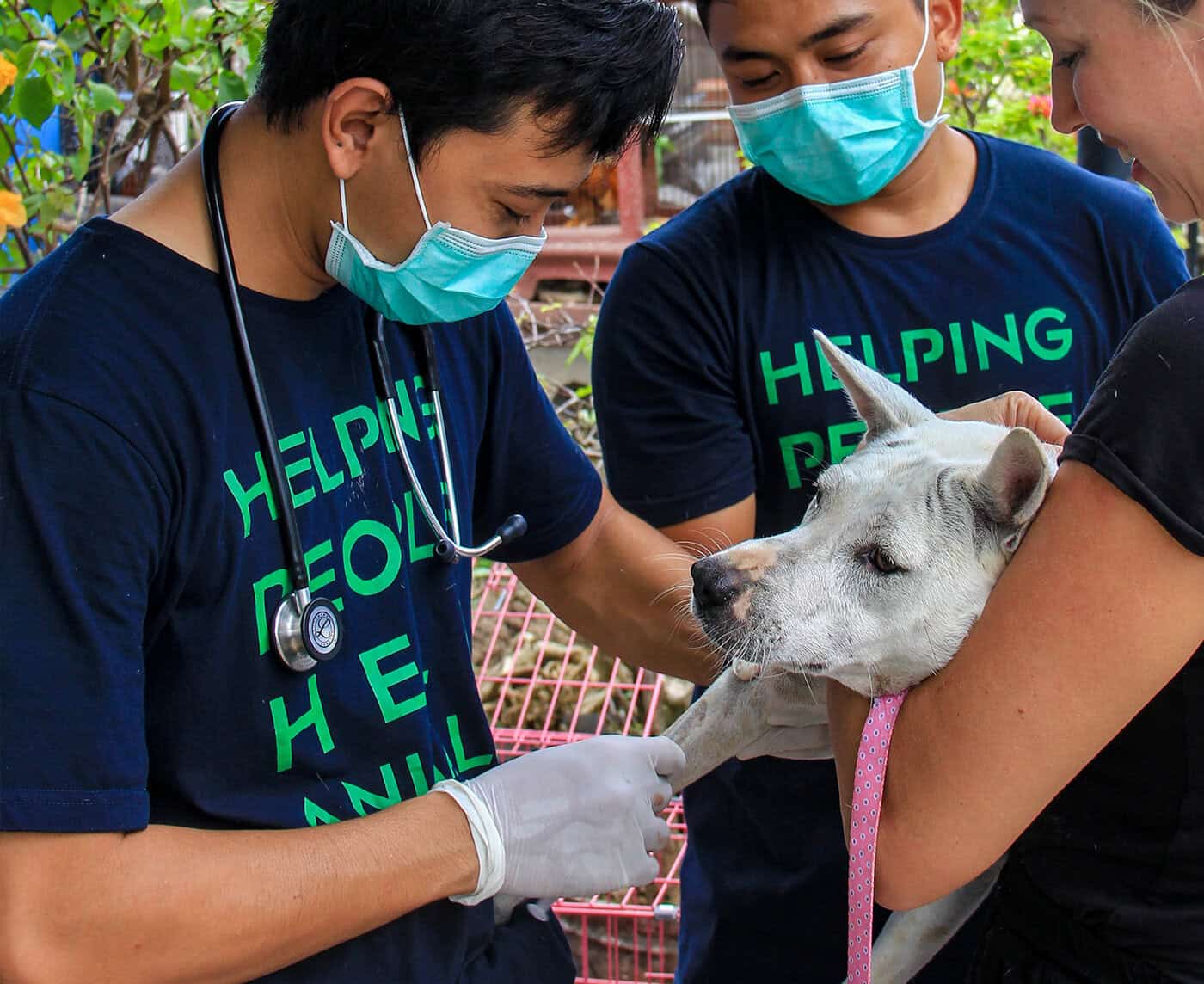Curious about the canine community in Bali? You’re not alone. Two common questions often arise: “Why are so many stray dogs roaming the streets?” and “What’s that charming local dog breed we keep seeing?” Whether you’re captivated by Bali’s four-legged locals or concerned about their well-being, we’re here to provide comprehensive insights. Dive into the world of Bali dogs with us as we unravel the mystery behind the island’s stray population and introduce you to the beloved native breeds that are part of Bali’s cultural tapestry.
Bali Native Dog Breeds

The Bali Dog, also known as the Kintamani dog, is an ancient breed native to the island. These dogs have been a part of Balinese culture for thousands of years and are known for their loyalty and adaptability.
This breed is native to the Kintamani region and is recognized for its distinct appearance and characteristics. The Bali Dog typically features a medium-sized, muscular body with a thick coat, erect ears, and a bushy tail. Known for its loyalty and intelligence, the Bali Dog has been a companion to locals for centuries and plays a significant role in traditional Balinese ceremonies.
The Kintamani Bali Dog boasts a rich history that spans thousands of years. Over generations, these dogs have seamlessly blended into Balinese life, adapting to the local environment and communities. Their robust constitution enables them to thrive on village scraps, allowing them to live as strays with remarkable ease.

Also The Kintamani dog from Bali has achieved international recognition from the Fédération Cynologique Internationale (FCI), the global federation of national kennel clubs. This milestone was formally announced on February 20, with the recognition letter signed by Yves De Clercq, the FCI’s Executive Director.
As natural hunters, Kintamani Bali Dogs are adept at fending for themselves. They are fiercely territorial, often guarding their human companions from intruders and other dogs. Many Balinese believe that these dogs possess a unique ability to sense the presence of spirits, both benevolent and malevolent, adding a mystical element to their revered status in local culture.
Despite their long history on the island, Bali Dogs face challenges due to modernization and the influx of foreign dog breeds.
Why Are There So Many Stray Dogs in Bali?
Bali’s stray dog population is influenced by several factors, including cultural practices, economic conditions, and limited animal control measures. Traditionally, dogs in Bali are considered semi-wild or community animals, often living on scraps and roaming freely. Economic challenges and lack of widespread spaying and neutering programs have exacerbated the stray dog issue. Additionally, the free-roaming nature of these dogs means they frequently breed, contributing to the growing number of strays seen on the streets and beaches of Bali.
How Does the Local Culture View Bali Dogs and Strays?
In Balinese culture, dogs, particularly the native Bali Dog breed, hold significant cultural and spiritual value. They are often seen as guardians of the home and are believed to possess spiritual qualities that can sense the presence of benevolent or malevolent spirits. Stray dogs, while less revered, are generally regarded with compassion by locals. Community efforts often focus on managing and caring for these animals, reflecting a deep-rooted respect for dogs within Balinese society, despite the challenges presented by their numbers.
What Are Some Initiatives to Help Stray Dogs in Bali?
Several initiatives are in place to address the stray dog issue in Bali. Local and international organizations run spay and neuter programs to control the dog population and reduce the number of strays. Shelters and rescue groups provide medical care, food, and shelter to stray dogs, working to improve their quality of life. Additionally, community outreach programs aim to educate residents about responsible pet ownership and animal welfare, helping to foster a more supportive environment for stray dogs.
Do Balinese Dogs Carry Rabies?
Rabies is a concern for stray dogs in Bali, including the native Bali Dog breed. Although many Bali dogs are vaccinated, the high population of stray dogs means that the risk of rabies transmission exists. It is crucial for anyone coming into contact with stray dogs to seek medical advice and get a rabies vaccination if necessary. Local health authorities and animal welfare organizations work to manage and control rabies through vaccination programs and public health initiatives, aiming to reduce the risk to both animals and humans.
Bali Dog Rescue Center
Fortunately, several dedicated dog rescue centers in Bali are working tirelessly to improve the lives of these animals. These organizations provide shelter, medical care, and rehabilitation for dogs in need, offering a second chance to many who might otherwise suffer on the streets.

Bali Animal Welfare Association (BAWA)
BAWA is a non-profit organization founded in 2007 that focuses on saving, protecting, and improving the lives of animals across Bali. Their services include:
- Rescue and rehabilitation
- Sterilization programs
- Disease prevention
- Community education
BAWA operates a 24/7 animal ambulance service and conducts mass vaccination programs to combat rabies. They welcome volunteers and accept donations to support their mission.
Bali Dog Adoption and Rehabilitation Centre (BARC)
BARC is a no-kill shelter providing comprehensive care for rescued animals. Their programs include:
- Vaccination and sterilization
- Medical assistance
- Fostering and adoption services
- Education programs in schools
BARC offers volunteering opportunities and accepts donations of both funds and supplies like dry food and toys.
Bali Pet Crusaders
Focusing on population control, Bali Pet Crusaders offers:
- Mobile sterilization services
- Free spay/neuter clinics
- Education on responsible pet ownership
Their team of professional vets travels to rural areas and rabies red-zones to provide these essential services.
Dog-Friendly Café Culture
The trend of dog-friendly cafés in Bali has gained popularity, providing welcoming spaces where dog owners can enjoy a meal or coffee with their furry friends. These cafés offer a unique experience for both pets and their owners.
Must-Visit Cafés
- The Dog’s Bar
- Features: This café offers a cozy atmosphere with a dedicated space for dogs, including special treats and amenities for pets.
- Special Services: Enjoy a variety of dog-friendly treats and meet other pet lovers in a relaxed setting.
- Bark and Brew Café
- Features: Known for its extensive menu of dog-friendly options and comfortable seating, Bark and Brew is a favorite among pet owners.
- Special Services: They offer dog-friendly snacks and a play area for pets to socialize.
- Paw Print Café
- Features: Paw Print Café provides a charming environment with a focus on both human and canine comfort.
- Special Services: Look out for their monthly pet events and dog-friendly menu items.
Tips for Visiting
When visiting dog cafés, it’s essential to follow etiquette guidelines. Ensure your dog is well-behaved, follow café rules, and respect other patrons. This helps create a pleasant experience for everyone.
Conclusion
Understanding and supporting the canine community in Bali enriches your experience on the island. From exploring native breeds and supporting shelters to enjoying time at dog-friendly cafés, there are numerous ways to engage with Bali’s vibrant dog culture. By participating in these activities, you contribute to the well-being of Bali’s dogs and enhance the island’s dynamic pet-friendly environment.
FAQ
The number of stray dogs in Bali is a subject of varying estimates, but most recent reports suggest a population of around 500,000. According to the Disease Eradication and Environmental Health Division at the Bali Provincial Health Office, this number is increasing by approximately 3% annually.
Dogs in Bali are often respected and valued for their spiritual and protective roles. However, the perception of their sacredness can vary, influenced by both traditional beliefs and modern practices
It’s a bit of grey area. By law, is it prohibited – illegal. You may find some services that can help you bring your dog to Bali. But please note that it is currently not possible to bring your dog to Bali. Bali has strict regulations prohibiting the import of pets, including dogs and cats, as part of its efforts to maintain its rabies-free status


